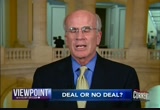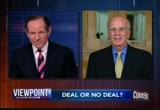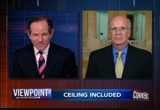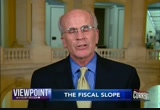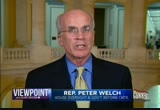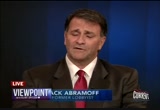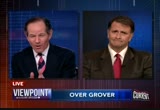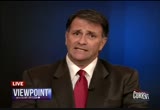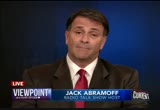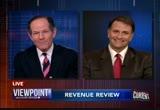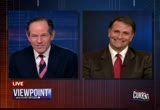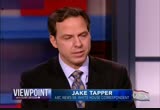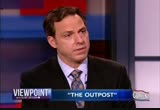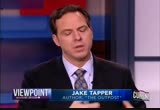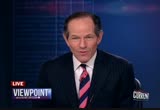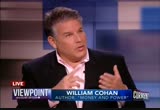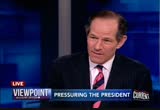tv Viewpoint With Eliot Spitzer Current November 27, 2012 5:00pm-6:00pm PST
5:00 pm
prevailing thought is they don't think minorities will ever vote republican." so one more time, throw him in there. throw the elbow in there. yes, it is about eliminating the black vote. of course! all right. glad somebody finally told the truth. have a great evening. see you tomorrow. >> eliot: good evening. i'm eliot spitzer. this is "viewpoint." three weeks ago campaign season came to a conclusion. or so we thought. with the impending austerity bomb better known as the fiscal cliff, quickly approaching both sides seem to think of a way to push for the deal they want is to take their case to the american public. today, the white house announced the president will travel to a manufacturing facility in pennsylvania on friday for campaign-style event designed to boost public support for a package that includes tax rate
5:01 pm
increases for the wealthy. not to be outdone speaker boehner announced that house republicans would be making similar appearances across the country, going to small businesses to speak about the "threat to jobs posed by congressional democrats" small business tax hike. while members of congress plan to take their case to the american people, the afl-cio is planning to take the american people to members of congress sending 33 local union leaders to capitol hill to push members of congress to let the bush tax cuts expire and leave social security untouched. one positive to emerge from negotiations so far has been that for the first time in recent memory, republicans have expressed an openness to increased revenues which means the choke hold grover norquist and his tax pledge held on republicans may be loosening. frank bruni thinks republicans devolved into dummies and nor west was their ventriloquist. not everyone saw norquist as the cause of the problem.
5:02 pm
defending him truth is that mr. norquist doesn't have such power. the voters do. he had the wit to channel the electorate's limited government beliefs into a single issue enforcement mechanism. long-time ally of norquist, jack abramoff who joins me in a moment said simply, news of grover's demise is premature. but in recent interviews, norquist has begun to sound like a petulant leader on the way out. >> the pledge is not for l.i.e. everybody who signed the pledge including peter king, who tried to weasel out of it, shame on him as the new york sun said today, i hope his wife understands that commitments last a little longer than two years or something. >> eliot: warren buffett continued to be the pragmatic voice of the majority. >> i think there is a general feeling among the american public certainly and even among many in congress that the rich like me have been getting away with low tax rates and it is time to make the tax rates more progressive. >> eliot: for more on the fiscal cliff negotiations, i'm
5:03 pm
joined by congressman peter welch, democrat from vermont. thank you for joining us. >> thank you. >> eliot: what should the deal look like? all of the chatter, smoke and mirrors, what is the deal you would like to see? >> well, first of all, i do believe the middle class has a stake and a good, solid balanced, deficit reduction plan. the plan should be what the president campaigned on, namely balance. that means we've got to have a substantial contribution from revenues. the revenues have to come from the folks who have been making good money during the recession. that's folks over $250,000 or some number close to. that the pentagon's got to make a contribution and if there is anything on healthcare, it's gotta be about reforming it, bringing the costs down, not cutting benefits. >> eliot: let's drill down a couple of pieces of this. what do you think the underlying ratio should be between cost cutting and revenue generation. last summer it was 10 to 1 in terms of cutting costs to revenue. thankfully the deal didn't get done. should it be one-to-one? where would you like to see this happen? >> you know, i actually don't know that number because i think
5:04 pm
the question is i think we need about a trillion and a half from revenues and the revenues have to come, as i mentioned the way president obama was campaigning. and then the pentagon's gotta make a contribution and we've already cut a trillion and a half dollars on domestic discretionary. we'll have to cut more to get a deal. but with the ratio is, i haven't been that close to what the numbers are. >> eliot: one of the issues lurking out there is the debt ceiling and it seems necessary to me to include as part of this grand bargain if one is ever struck, an agreement there will not be another negotiation in a month or two because the republicans in the house refuse to raise the debt ceiling. does that have to be wrapped into this deal? >> absolutely. we committed political malpractice in 2011. we got -- mcconnell held out for $800 billion in tax breaks for the high income folks. we got $13 billion in extended unemployment benefits in december. then you come back in april and may and we start arguing about the debt ceiling.
5:05 pm
we had to raise it in order to meet the deal the president agreed to. we cannot make the same mistake twice. that has to be part of any resolution. >> eliot: i could not agree more with you. i remember when this happened. a lot of folks i included were screaming saying wrap this into one bargain. for whatever reason, the white house didn't listen. the republicans, this is good news, i suppose have used the word revenue. the contours of the debate have shifted. they're a little mushy. at least three different theories here. you could have the bucket approach to cap deductions. you can eliminate loopholes or raise rates above the $250,000 going back to the clinton era rates. of the three which do you think they actually intend to do? >> they want to talk about revenue generating from eliminating deductions or capping them. they don't want to talk about rates. you know, the bottom line here is that we need a certain amount of revenues, let's say the president's talking $1.6 trillion and he's also saying it has to come from the folks $250,000 and above particularly
5:06 pm
the folks making more than a million dollars. however do you that is fine. what you want to make certain we do is put a hit on the middle class because they can't afford it and that will hurt the economic recovery. by the way you know, this is an opportunity on debt reduction to talk about our budget. there are areas we should be spending money like infrastructure. i mean it is incredible that we've got this 19th century infrastructure in this country and think we're going to be a global economic power. we ought to be talking about reforming healthcare. not just medicare. but you know, why don't we negotiate prices for prescription drugs? that would save us $160 billion over ten years. the fee for service volume-driven system that's making it unaffordable, these are things that ought to be put into the discussion and not have it just be what's the ratio because bottom line, we have to come up with something that's more efficient, more effective more sustainable. >> eliot: you make a hugely important point. no question when it comes to healthcare, we have to change, bend to the curve to use the
5:07 pm
language of washington, d.c. or else we will have a crisis. on the other hand, there are other areas of government spending where we must invest and as you point out in 19th century infrastructure does not make us competitive and what's been lost in some of the conversation here is the necessity of making those investments. are you going to try to lead the charge to bring us back to a more sensible middle ground on this? >> i am. i think some republicans might agree on that. what we've been here for two years is ideological lockdown. we haven't been in problem solving. bottom line, republicans are now starting to acknowledge we need revenues. whether the speaker will be successful in getting them to say yes when he gets specific remains to be seen. by the way i think is much more important for us to get a good, substantial deal that's sustainable and makes a dent in the deficit without hurting the economy and if we do that on january 15th and it is a good deal, i would much prefer that over doing a bad deal on december 15th for face-saving on the january 1 fiscal cliff drop dead date. >> eliot: you're among the
5:08 pm
group that have been called the cliff jumpers. i don't know how you take that phrase but you've been willing to say let's go over the cliff. it will not be as dangerous and as cataclysmic as people are saying. >> i'm in good company. warren buffett. basically this artificial deadline is not a cliff. it is a slope. the bottom line is we've got to get a good deal. something that is sustainable and durable and not hit the panic button and then try to spin what is a bad deal as a good deal because that won't be sustainable after january 1st. >> eliot: that's not only correct on substance. unless we say that, the other side will stick us up and hold us to the deadline and get us to flinch at the end which unfortunately has been the history of the white house in the last couple of years. your wisdom there, i hope they're listening loud and clear to you congressman. >> thank you. >> eliot: congressman peter welch, democrat from vermont thank you for your time. >> thanks, eliot. >> eliot: for more on grover norquist apparent diminishing influence, i'm joined by
5:09 pm
lobbyist jack abrom off the author of "capitol punishment." jack, thank you for joining us. >> thanks for having me. >> eliot: look, are you dealing and are you a defender of grover norquist but you must admit there is a new reality taking hold with many republicans acknowledging speaker boehner revenue must go up. doesn't that change the playing field in a way that grover norquist must not be happy with? >> well, i think too much emphasis, eliot is put on grover. i think people forget the fact that republicans are just genetically against raising taxes. i think grover's pledge and grover's efforts may maybe reflect the reality of the republican viewpoint. the majority of republicans who still feel raising taxes is detrimental, especially if we're trying to get the economy going. this has become the grover issue because that is convenient and interesting. and he's an interesting character. but the fact is republicans i think at their core and
5:10 pm
conservatives certainly are against it. i think the speaker moves with very -- he's in a tough position. on the one hand, he seems to be wanting to make a deal but on the other hand they have to remember there are primaries coming up in a couple of years and the economy may very well turn things around begin. we've been living in a pendulous situation where things go backward and forward. patience probably on the part of the republicans is probably the bye word right now. >> eliot: there has been a pendulum swing that's been quick and in '08, we had the rebound of the republican party. 2012 clearly a democratic year. the public is disaffected in votes against the incumbent power. no question about that. having said that, you're right grover norquist is a personification of something that does have broad appeal. having said that there is a reality and i want you to deal with this. revenue at the federal level dropped as warren buffett wrote about in his op-ed to 15.5% of gdp. when you're spending about 21% in revenues normally at about
5:11 pm
18% or 19% that's where a big piece of the deficit comes from. you can't want government revenue to be stuck at 15.5%. that's way down from historical norm. don't you think we have to boost it somehow? >> well, first of all, there were never pieces that came out today disputing these numbers but let's take the numbers for a second. i think the bigger argument here that in terms of what's going on in the republican circles is should the government be spending this kind of money to begin with? should the republicans come to yet again bail out what they feel is an out-of-control government in it happened in 1982. it happened in 1990 with promises in '82 of two times every dollar spent would be cuts. three times in '90. neither time it materialized. i think both of those historical experiences are weighing heavily on this debate and will probably lead republicans to reconsider whether or not they want to raise taxes and anger their base. >> eliot: there is some truth to what you're saying but that is why cuts are part of what would be the so-called grand
5:12 pm
bargain. just to come back to the numbers for a minute, 15.5% of gdp revenue for the government, if you wanted the government to spend only that, you would have to cut well over a trillion dollars a year from federal spending. i don't think anybody -- you included would agree that's simply not possible. >> no. i agree with you. there's just no way to cut enough money out of the budget. there isn't enough money in the budget to cut it to balance the budget. the only way out of our economic problem is growth. i think that, in fact, president obama himself two years ago extending the tax cuts said the very same thing. they've didn't want to raise taxes when the economy was -- and not doing it would enable stronger growth. i'm not certain the economy is much better right now. i think from a republican point of view, the way out of the problem is that which has been articulated for years. jack kemp used to say it. growth. that's what i think republicans will focus on. >> eliot: jack, growth is everybody's favorite elixir. it makes life easy.
5:13 pm
when you have growth rates at 1% to 2% of gdp an ruly and you have fundamentally altered the tax code so you're bringing in only 15% of gdp here is where arithmetic comes into play. it simply doesn't add up. you get a structural deficit approaching a trillion dollars a year which is why i think even john boehner when he sits down, smart guy says i acknowledge we've got to do something on the revenue side. that's where i think grover norquist, not to make him the lightning rod is in a tight bientd because the numbers don't add up. that's where your argue really falls apart. >> i guess what i'm presenting more is the political picture that it's going to be -- not withstanding the assertion that it is 15% of gdp. where it should wind up, you can find a lot of conservatives who would say 15% of gdp is too much anyway but that's a separate argument. what i'm saying is politically it will be very, very tough on those republicans, other than the current ones who have
5:14 pm
announced they have sort of abandoned the pledge. these guys were doing it for the last couple of years anyway to. see the leadership in the republican house do it, they may wind up some challenges. the republican party in the house is used to having a coup d'etat. >> eliot: as a democrat, i would love to see the primaries from the far right. certainly in the senate side. we'll continue that conversation down the road. jack abramoff, author of capital punishment, thanks for your insights tonight. >> thanks for having me. >> eliot: susan rice met with her g.o.p. critics and nobody walked out happy. answer in a moment.
5:17 pm
>> eliot: there seems to be only one business model out there, cut wages, reduce benefits and drive down hours. some would say it is the only way to keep the market happy but then there's our number of the day. $19.50 an hour. that's what a worker at costco makes after 2004 and a half years -- after four and a half years according to liza featherstone of slate. about $7 more than employees with the same seniority at costco's competitor, sam's club, get paid. some wall street analysts haven't been happy about that or about the company's generous health plan. costco has given away cash yet the company does fine. the value of costco stock has more than doubled since 2009, outperforming walmart's. the company's founder james sinegal said the wages give the company a low rate of employee turnover and a whole lot of loyalty. costco's approach got renewed
5:18 pm
publicity when walmart became mired in strikes over low pay and bad labor relations. although walmart is admittedly a much bigger company, the costco model proves there are many ways to build a big profitable company. walmart's way is not the only way to do business. >>science and republicans do not mix. >>now it's your turn at the only online forum with a direct line to eliot spitzer. >>join the debate now. >> eliot: just when we thought the door on benghazi gait might be close it seems today to have swung back open. following a meeting with acting c.i.a. director michael morrell and u.n. ambassador susan rice who has become the focal point of the event. they emerged with their talking points unified and intact. >> we're significantly troubled by many of the answers that we
5:19 pm
got and some that we didn't get. >> i'm more troubled today knowing, having met with the acting director of the c.i.a. and ambassador rice. >> bottom line, i'm more disturbed now than i was before. >> eliot: for her part, ambassador rice released a statement shortly after the meeting reiterating her defense. i quote "we stressed that neither i nor anyone else in the administration intended to mislead the american people at any stage in this process and the administration updated congress and the american people as our assessments evolved." joining us now is abc white house correspondent jake tapper, the author of the much lauded new book "the outpost." first, i want to ask you about benghazi gate. honestly die understand what the senators continue to be upset about. susan rice has acknowledged her statements were wrong but were based upon the best intelligence at the moment. is there any reason not to believe that statement on her part? >> well, one of the things that
5:20 pm
senator graham said today was that he wants more of the investigation -- the information to come out. the fbi agents who had interviewed survivors of the attack. and he wants to know more information before he says he would be willing to elevate somebody who was involved in any part of this controversy. i do think that susan rice is not really the one that i am personally most concerned about. just as a. >> reporter: trying to find out the truth. the state department itself and susan rice is part of it but not really involved in deciding why they didn't get adequate security who did what in terms of trying to help the people who were pinned down. that seems to be more of a c.i.a. question. those are the people i really want to find out more about. >> eliot: i think that's exactly right. there are a myriad of legitimate questions that should be asked about the information through the decision making but it seems to me susan rice is the least informed, least interesting party here and that's why trying to take her hostage in effect at a moment where she might be
5:21 pm
elevated to secretary of state suggests a larger political agenda. i don't want to impute to senator mccain or graham but is there an element of tweaking the president here? >> there always is. whatever party is doing it. one of the things that sounded interesting from senator ayotte is that based on her comments, she seemed more concerned about what she heard from the acting c.i.a. director, mike morrell than -- she named him first and susan rice was almost an afterthought. i wonder if that was what was disturbing to senator ayotte or any of the other senators. >> eliot: that might be more legitimate although the c.i.a. if you listen to david petraeus said we knew this was not a spontaneous revolt or spontaneous eruption and therefore our information -- look, this will continue for some period of time. let's switch gears a little bit to what's going on in egypt. which seems to be sort of gripping us at an international level. morsi on one day is a hero. he's brokered a deal. the second day he's under
5:22 pm
assault by the very people in the street who swept him into power. how do you assess what's going on and our capacity to nudge him toward maintaining a democratic framework? >> the nudging is being done by members of the international monetary fund and individuals saying to egypt if you want money for your country to thrive, you have to backtrack a little. one of the interesting dynamics going on here is that as difficult as morsi's actions the other day were to swallow for those of us who live in a democracy, the judiciary there is really not blameless either. they dissolved one of the houses of parliament there. there is a threat they may do it to the other legislative body. i do think that morsi might be -- his power grab might be unseemly and undemocratic but there is something nefarious going on by the other branch. >> eliot: his power grab was terribly calibrated. there is a school of thought he had a lot of international goodwill. he thought he could get away
5:23 pm
with it domestically. the folks on the street said not so fast. the judiciary is a holdover from the mubarak era. they had been pushing back from the legitimate things he wanted to do such as crafting a constitution and so there is a more delicate balance than perhaps has been obvious from the front. who are the folks in the street? is it the more secular piece of the pop you on populous and the muslim brotherhood still behind him and is it saying morsi you've gone too far? >> from what i understand, the muslim brotherhood is behind him. it is a largely religious organization in a lot of ways. it believes in a theo cratic rule. i think the issue is a lot of the young people in the democratic reformers who are marching in the street, they weren't as organized and that's why the muslim brotherhood which was very organized was able to grab the reins of power. i think there is a -- there always to be a chasm between these two groups.
5:24 pm
>> eliot: if you go back to when tahrir square was occupied, the muslim brotherhood wasn't there. interesting dynamic. let's go to afghanistan. of course, the topic -- your book has gotten raye reviews. it uses this one outpost and battle for a metaphor for the entire war. as you look forward to 2014, should we have 10,000 troops there? can they serve a purpose? >> i think without question, the troops that are going to be there after the combat troops withdrawal, everybody talking about the obama administration when they were running for re-election, talked about biden -- vice president biden said we're going to leave in 2014. that's the end of it. that's not the end of it. there is a counterterrorist force. there is a lieutenant in my book who was there as a regular combat soldier and is now a special forces soldier. and he is very optimistic and things that the work done at that outpost, he's in the minority. the work done is positive and is
5:25 pm
affecting change. i think -- >> eliot: in what way? as one who has been a skeptic of what we could succeed through military strength in a region where the tal band al-qaeda -- the taliban seems enmeshed and woven into the fabric of society. what have we accomplished? >> the book traces this one outpost from 2006 until 2009 when overrun by the taliban. in 2007-2008, that's a part of the narrative when there actually is very tangible achievement and the u.s. and the afghan government is willing to win over the local populous and get them to start casting out the terrorists in the villages and hamlets and this one lieutenant, alex newsom who was in afghanistan early this year doing special operations missions, says that when he went back to this area, the people there all remembered him. they were still anti-taliban. they were still willing to fight. he was very encouraged. as i said, he's in the minority there. but it wasn't as if all of these
5:26 pm
individuals, all of a sudden became taliban. mainly they don't want anyone bothering them. >> eliot: that's the question. no doubt. our presence there can have that affirmative effect. was it possible -- is it possible to argue that there would have been a pushback that might have been stronger without an external force where we become, in a way the enemy. we become the invading presence, the empire that people have rejected for thousands of years. >> i don't know. what the book illustrates is this counter insurgency, trying to win over the local population. get them to adopt the development. it can work but it is very, very fragile and very, very difficult to do. and so when it does happen, it all -- there is a catastrophic event and i'm not going to spoil the book for you but there is a catastrophic event that makes it all go to hell then within a year, they're overrun. >> eliot: haven't yet read it but i will. congratulations, spectacular. one last question. you can dodge it if you want.
5:27 pm
5:29 pm
5:30 pm
him with hidden fees. so he can worry about other things like what the market is doing and being ready, no matter what happens which isn't rocket science. it's just common sense from td ameritrade. >> eliot: coming up, the less fortunate need our help. and some think that includes goldman sachs. but first, the empire state building light show, the john kerry fan club and the winners and losers in the middle east. when it doesn't fit anywhere else, we put it in the viewfinder. >> broadway wasn't the only place to catch a good show last night. the empire state building put on its first ever light show. it showed off the building's new l.e.d. lighting system. >> new york's legendary skyscraper has a new look. >> now the building has upgraded its lighting system, gone are the old floodlights rerks placed by a state-of-the-art
5:31 pm
computerized system that can deliver all kinds of colors. take a look at that. >> all new all l.e.d. all unveiled for the first time during an historic light show at the empire state building. >> that's it right there. it is the tallest building in the world. nearest thing to hev than we have in new york. >> i'm a little bit of a traditionalist. >> u.n. ambassador susan rice goes up to capitol hill. at her own idea. and meets with three lawmakers who could be critical to her possible nomination as secretary of state. how did it go? not so well from the early reports. >> that's not the launchpad for a successful tenure as secretary of state. of course, waiting in the wings john kerry. >> i don't think that john kerry is really an everyone's a list on the republican side anyway. >> some people are speculating that john kerry might be the new
5:32 pm
secretary of state. would you be for or against that? >> oh! i would pass out! >> so while we're away, the middle east exploded in violence. centering on the gaza strip. this is such a depressing, school cyclical status quo. there are no winners here. or to put that a different way -- >> who was the big winner do you think here? >> who are the losers and who are the winners? [ laughter ] >> you really miss the election, don't you? >> now that the election is over and ron paul is out of the picture, is there anything you want to say to him? >> thanks for being amazing. we love you and you taught us all so much. >> eliot: always true. jon stewart is the one who sees it the right way. a group of ceos walk right into the middle of the entitlement fight coming up ahead.
5:35 pm
>> eliot: over $12 billion in taxpayer money went to goldman sachs to make sure they didn't lose a penny on their aig. in 24 cases corporate leaders received more in compensation than their businesses paid in federal corporate income taxes. now ceos of these and other companies are suggesting ways to cover the federal deficit. who do they think should bear the burden? the poor. the corporate chiefs have banded together with campaign to fix the debt and are ubiquitous in the media calling for major safety net programs, medicare and medicaid to be pared back. he made it clear to cbs news. >> you're going to have to undoubtedly do something to lower people's expectations. the entitlements and what people think that they're going to get because it's not -- they're not going to get it. >> eliot: thank you, lloyd. not a popular sentiment to be sure. they're for tax changes that would save their companies over
5:36 pm
$100 billion a year. to take a hard look at the views these ceos are espousing let's bring in bill cohen bloomberg view columnist and author of "money and power" how goldman sachs came to rule the world. and lynn, let me start with you is this campaign to fix the debt just a trojan horse behind which the ceos are trying to implement? things that would be really good for them? >> i think it is. i think they were really hoping some of them that mitt romney might win the election and get some of these things done without them having to go public but now, as we just saw lloyd blankfein and others are going on a public campaign to convince americans we can't afford social safety net programs and they need a windfall and tax breaks. the spirit of giving is a little hard to find among some of them. >> eliot: bill, you have been critical of your former brethren on wall street. you've been rational. you have to admit they're not the best messengers for this right now. >> they're terrible messengers. i don't really understand lloyd
5:37 pm
blankfein his thought going on cbs news tv for so long then he does go on and they take two minute clip out of a 40-minute segment and basically string him up with it. it is unfortunate. i don't think they're the best messenger. they would admit they're not the best messenger for this. but on the other hand, eliot i think it is important to point out the business roundtable is more to the extreme right of these guys. they're trying to be cooperative and bipartisan. >> >> eliot: worse argument. good friend, here's the thing. lloyd blankfein, wall street, the personification of wall street is goldman sachs. they have gotten so much money out of taxpayer pockets and here he's saying first thing give us a tax break which may make some -- then cut social security. social security isn't even adding to the deficit. is there a defense for this? >> not really. i think -- but you have to look again to the wider -- program
5:38 pm
that they're proposing which is lloyd blankfein said in his "wall street journal" op-ed, he would be happy to have his taxes raised. a lot of these guys to their credit have said they're willing to have their taxes raised. so clearly there has to be more than just a cut entitlements part of this problem. >> eliot: i give lloyd credit. when you have been intensely critical of this. why so harsh on them? they're saying some reasonable things. >> well, i think that in some ways, gold has gotten a little but bit out of alignment. there was a time when ceos would not so brazen as to talk about cutting entitlements in a time when a lot of people are suffering and we have a huge jobs deficit. that's the real deficit that we need to worry about right now. for example jeffrey is part of this group. going around talking about cutting social safety net. his predecessor from the 20s and 40s owen young talked publicly about economic equality. he actually talked about how a man could not be free unless his wages were good. unless he was secure in his
5:39 pm
future and secured his retirement. it is a very different tune. >> eliot: let's make an important point. would the gold blankfein's of the world acknowledge there was some disparities, the ratio of ceo to comp that was crazy and they said we're going to pare that back. >> the compensation is out of whack. we got bailed out. we haven't been criminally prosecuted. the stock market has doubled. stock market has doubled under the obama administration. who we don't like. who we fought valiantly to try to defeat. they would have a lot more credibility if they said that. again, i made the argument that you know whatever it is, the business of the american people, you know used to be general motors. it was good for general motors, it was good for the american people. that same concept a derivative of that still applies. we cannot have wall street and corporate ceos going at the white house in washington. it just isn't going to be good for anybody.
5:40 pm
so they've gotta figure out a way to get along. this is like a pathetic attempt really to try to get along. >> eliot: there's a larger point here for a separate time. it used to be the case what was good for g.m. was good for america. now when g.m. produces more cars in china than here, it is not so clear the interests are unified. is that the point here? what lloyd blankfein is saying, the tax changes they want may be good for the businesses but may not be good for us as a political entity. >> i don't think they're good for the businesses. i think this is very short-term thinking. i don't think they're thinking about the long horizon. what they're talking about is the result of the financialization of companies and ceos obsessed with short-term profits manipulating the stock prices so they get short-term compensation. in some cases that's not even good for the company ten years down the road. they've forgotten taxpayers and employees are their constituents just as much as shareholders. >> i think what they're really saying here is we've got to solve this federal deficit issue. we can't have this quote-unquote fiscal cliff-hanging out there. they're saying that unemployment
5:41 pm
will rise a percentage point we'll go into a double-dip recession. if either of those two things happen, that's going to be very bad for wages for the common man, it is going to be bad for the stock market, for everybody who's got investments there. it is going to be bad for our whole mental outlook as a country. >> eliot: all of those are fair points. the question is the particular policies that they're proposing, just don't align with what i think many people, i included, see as being good for our economy at large. let me switch to the politics of this. do you think lynn, that this group, has much political sway? as you said, they campaigned vigorously against barack obama. so when lloyd blankfein and wall street say cut our taxes will, the president give them the back of the hand or welcome them in? >> i would not underestimate the influence that these guys have in washington. some have been part of obama's inner circle. jeffrey has sat on the head of the jobs council. the ceo of boeing is the chairman of the export council.
5:42 pm
so they do have a lot of influence. they contribute a lot to political campaigns and they have lobbyists crawling all over washington to speak for them. >> eliot: bill, you've seen it. why do they hold such sway? the scoundrels of the economic cataclysm. why do they still walk back in there and people lay down the red carpet? >> eliot it's money. it is not that much either. if you look at the top -- eight of the top ten supporters of obama in 2008 were wall street firms, this time around, eight of the top ten biggest supporters for romney were wall street firms. it is not that much money. it is like a million and a half bucks coming out of goldman sachs. number one biggest supporter for romney. they can get a lot of influence. this isn't new. this has been going on for 100 years. sidney weinberg was going back and forth between fdr's cabinet and goldman sachs for years. >> eliot: compared to what these companies are worth and their revenue, the amounts of money they put into politics to
5:43 pm
get this way is diminimus. it is tiny. >> more than everybody else. >> eliot: one other thing in washington people still confuse success in business with intellect. a mistake people should not make. senior editor, lynn paramour, bill cohan, thank you for your time tonight. the future of the defense of marriage act probably rests with the justices of the supreme court. richard socarides joins me coming up ahead.
5:46 pm
>> eliot: climate change immigration, gun control, just three of the issues a president can confront on his own during his second term. that's ahead in my view. be sure to join jennifer granholm "the war room" where she'll be dive nothing the future of electric vehicles and the political forces limiting their growth. that's at 10:00 p.m. eastern. for now, more "viewpoint" coming right up. and gabriel corcos talk tuskin cooking. and there better be snacks, just sayin'.
5:47 pm
>> eliot: the marquee legislative accomplishment of the obama administration's first term healthcare reform, was passed before we entered the world of divided government. where republican-controlled house puts a real damper on anything transformational. any progress that requires both house and senate approval is likely to be incremental and driven by unique political argument. such as the current imperative that republicans agree to some form of immigration reform. less they truly morph into a party of angry white men. or the current obligation to compromise in fiscal issues as we face the austerity bomb set to detonate on january 1. the reality of split government puts a premium on creativity within the administration. first, putting the right people in charge of the agencies and then pushing the bounds of administrative power to change
5:48 pm
the law and policy through those agencies wherever possible. don't despair. other than healthcare, some of the administration's most important first term accomplishments may fall into this category. for instance, a decision not to deport teenagers effectively implementing without legislative approval, the dream act. support for same-sex marriage and the substantial increase in cafe standards for auto efficiency. using administrative power should not be underestimated. all you need is the right people and the willingness to take a few risks and here with a hat tip to timothy who wrote a superb piece for the new republic focusing on this is a list of a couple of areas. on climate change, use the e.p.a.'s power to extend to existing power plants over time, tough standards on carbon emissions and cancel the keystone pipeline. on immigration, expand the waver program that applies only to kids. their categories of adults who are almost as sympathetic and who should be spared the fear of
5:49 pm
deportation. on finance get the s.e.c. and the other federal agencies to push their rule making to ensure that finally we get mortgage relief to homeowners whose mortgages exceed the value of their homes undoing the harm done by edward dimarco who for years, has been able to resist this. and on gun control use the government's leverage as the largest purchaser of guns to get gun companies to put common sense controls on the sale of multibullet magazines and semi-automatics. there is much that can be done even with a republican house. go for it! that's my view.
5:51 pm
>> eliot: huge steps forward for sure this year but the fight for marriage equality is far from over. even though proponents scored an unprecedented string of victories it he ballot box in four states, demonstrating public support for same-sex marriage the question inevitably remains what will america's highest court say about a constitutional right to same-sex marriage? the supreme court may begin to
5:52 pm
answer the question on friday when the justices are expected to decide whether they will be hearing cases this term concerning the 1996 defense of marriage act which defines marriage as a union between a man and a woman. in california, proposition 8, a voter approved initiative prohibiting same-sex marriage. joining me now to weigh in on what we might expect from the high court is richard socarides former president of equality matters who also served as a senior adviser to president clinton. as always, thanks for joining us. >> thanks for having me. >> eliot: what is the importance of friday or monday, depending on which day the supreme court announces their decision. >> at the end of this week or on monday, we'll begin to hear from the supreme court what they're going to decide this term in relation to gay marriage and gay rights. we're almost assuredly in for a big decision from the supreme court by the end of this term. we may as early as monday, hear that they have decided not to accept for review, the all-important proposition 8 case
5:53 pm
in california. if that happens that means that in california, same-sex marriage would be legal again as early as next tuesday. >> eliot: i'm going to ask you almost an unfair question. do you think that the conservative justices who oppose the notion of same-sex marriage want to grant review of the case merely to stall the reality of what you just articulated. if they don't review the case, california suddenly has same-sex marriage. >> it is tricky because normally i would say yes, they would probably want to grant -- to delay that and they may try some other tactics to delay it. they may defer it. but basically, you know, i think the writing's on the wall for california. the california appeals court issued a very narrow ruling in which it said just in california this. the ought to be restored. it may can be -- letting it just come back in california may be what the conservatives prefer. rather than to reviewing the case and then ending up with a far-reaching decision that says
5:54 pm
same-sex marriage out to be legal in all 50 states. >> eliot: another piece of the expansion of civil rights, the subtle interaction between the supreme court and the popular opinion, the supreme court does respond to popular opinion and therefore, the four publicly embraced referenda that said we are willing -- we and our states want same-sex marriage. that affects the supreme court. >> yes. that's why -- it is an excellent point. that's why these marriage referendums that we just saw in the last election, which for the first time, gay rights advocates won -- all four marriage equality referendums the timing of that was very important because it came just before the supreme court reviewed this. obviously the court is going to look to public opinion to see whether or not the country is ready for same-sex marriage. >> eliot: it is not as though the justice of the court take polls and say 50% is for -- therefore my view of constitutional rights changes. even conservative jurists understand one's sensibility of rights changes as -- there is an
5:55 pm
evolution. >> over time, it is what we've always seen on important civil rights issues in this country. certainly gay rights advocates were on the right side of those. >> eliot: these four victories stood in opposition. >> 30 consecutive straight losses. >> eliot: this is a hugely important point. >> very important. >> eliot: you wrote an article for the new yorker today in which you said there are other things that have to be done both by the administration and tick off a few of the things you would like to see the obama administration do. >> well, there is this executive order we've talked about on the show. >> eliot: which triggered the entire discourse about same-sex marriage. >> in some ways, it being in the mix was helpful in a practical way. so gay rights advocates want the president to sign -- very important executive order which would extend nondiscrimination provisions around sexual orientation to federal contractors. right now, the federal government cannot discriminate on the basis of sexual orientation or gender identity
5:56 pm
but that rule does not apply to federal contractors. advocates want that rule extended to federal contractors. it would be relatively easy to do and it would have a big effect because most big companies do business with the federal government. >> eliot: this actually -- and sort of impact level would be huge because there are so many companies that are contractors for the federal government and they were subjected to this or covered by this executive order and had to extend the civil right, it would reach a far bigger percentage of our economy. >> yes, it could be a way of doing, by executive order perhaps what you couldn't do by legislation because the republicans control the house. >> eliot: which is something i chatted about. there is a lot the president can do administratively. a lot of people, when you explain this hasn't been done. they say really? >> right. >> eliot: it is jarring that it hasn't been done yet or even before campaign season it hasn't been done. what's the holdup? >> there's been no federal legislation on employment protections. most states in this country, you can still be fired just because you're gay.
5:57 pm
the administration has done a lot. the other cases that we're going to start to hear about in the supreme court are the defense of marriage cases. of course, the obama administration has worked aggressively side by side with gay rights advocates to get the law overturned. on monday, we'll hear from the supreme court also it is going to take either one or more of those defense of marriage act cases and we'll have a decision on those in june. we're hopeful about those. >> eliot: leading to what maybe only lawyers can appreciate this. the rather rare situation where the attorney refused to defend the constitutionality. >> it was perhaps one of the gutsiest moves of the obama first term in which he was willing to take the risk of taking that position which is -- which was a very -- you know, presidents have done it but it is very infrequent that a president -- usually president's job is to defend the laws but this president said this law so offends the conscience that i'm not going to defend it anymore. >> i can tell you as a attorney general at the state
173 Views
IN COLLECTIONS
CURRENT Television Archive
Television Archive  Television Archive News Search Service
Television Archive News Search Service  The Chin Grimes TV News Archive
The Chin Grimes TV News Archive 
Uploaded by TV Archive on

 Live Music Archive
Live Music Archive Librivox Free Audio
Librivox Free Audio Metropolitan Museum
Metropolitan Museum Cleveland Museum of Art
Cleveland Museum of Art Internet Arcade
Internet Arcade Console Living Room
Console Living Room Books to Borrow
Books to Borrow Open Library
Open Library TV News
TV News Understanding 9/11
Understanding 9/11


